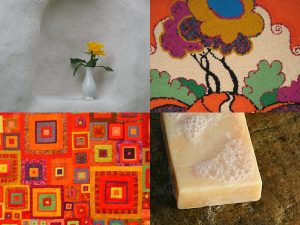Natural cleaning - introduction

Image: Chiot’s Run, CC BY NC-2.0
“Passive exposure to cleaning bleach in the home may have adverse effects on school-age children’s health by increasing the risk of respiratory and other infections.” – Lidia Casas et al, Occupational & Environmental Medicine
Contents
What is natural cleaning?
It’s about using cleaning products that don’t contain the toxic, synthetic chemicals found in many commercial brands. You can buy ‘green’ alternatives, or better still, make them yourself.
Big manufacturers are constantly bringing out new ‘improved’ products, which are basically petroleum-based detergents whose ingredients are often toxic, non-renewable, and take a long time to biodegrade.

You don’t need such a range of products; you can make your own natural cleaners from just a few basic ingredients:
Baking soda (or sodium bicarbonate / bicarbonate of soda): dissolves dirt and grease in water; abrasive, so good for surfaces; neutralises acids and removes odours too.
White (distilled) vinegar and lemon juice: nature’s acidic grease cutters.
Hydrogen peroxide: (3% conc. from chemists) a natural disinfectant produced by the human body and by the action of sunlight on water.
Borax: mineral (sodium, boron, oxygen and water), formed when salt lakes evaporate; very low toxicity, yet an effecitive fungicide and anti-bacterial cleaning and bleaching agent.
Cream of tartar: a natural leftover when grape juice is fermented into wine.
Washing soda: can only just be called non-toxic because of its high pH; use for very very stubborn stains (eg engine oil).
What are the benefits of natural cleaning?
Making your own means that:
- you add your own tap water, avoiding the transport of all the water found in commercial products;
- you can re-use containers, reducing the need to manufacture so much plastic;
- you save lots of money.
But the main benefit is that natural cleaners don’t cause the health and environmental problems associated with synthetic chemicals when they end up in our bodies or down the drain. Over 70,000 synthetic chemicals are manufactured, and only around 600 have been adequately tested (US Office of Environmental Affairs).

The human body has not evolved to cope with exposure to so many chemicals; asthma and cancers are widespread, and sperm counts are falling. The cocktails of chemicals that a lot of people use in their homes don’t help. Plus commercial cleaners produce toxic by-products in their manufacture, as well as in use.
Here’s just a tiny selection of chemicals typically found in commercial cleaning products, along with the problems they cause:
Phosphates (washing-up liquid, washing powders): too much for sewage systems, leads to algal blooms in rivers.
Paradichlorobenzine (toilet blocks, deodorisers): possible carcinogen.
Chlorine (bleaches): irritant, corrosive; can produce toxic gases when mixed with other cleaning fluids.
Petrochemicals (furniture polish, high-strength cleaners): eye, skin and respiratory irritant; can contain the carcinogen benzene.
Sodium hypochlorite (bleaches): corrosive; kills bacteria in sewage plants; eye, skin, respiratory irritant.
Artificial musks (air fresheners): liver toxin.

Formaldehyde: suspected carcinogen.
Perchloroethylene (dry cleaning): toxic air pollutant; probable carcinogen; a tiny amount will contaminate groundwater for many years.
What can I do?
When buying cleaning products, avoid anything with these words on the container: chlorine, ethylene/ethyl, butyl/alkyl, benzene, phenol and formaldehyde.
Many towns now have shops in which you can refill bottles with various cleaning products.
Be aware that many commercial providers look like family businesses when in fact they’re subsidiaries of giant corporations responsible for extracting wealth from communities and concentrating it in ways that damage democracy.

Check here for companies’ eco- and ethical credentials.
However, it’s really easy and cheap to make your own cleaning products. Here are some examples:
All-purpose cleaner: soap and water; or two tablespoons of baking soda in a litre of water.
Stain remover (surfaces): sprinkle with salt and lemon juice, leave for a while (a few hours for really bad stains) and wipe clean.
Stubborn stains: as a paste, baking soda and a little water removes stubborn stains from coffee cups, doors, appliances etc.
Carpet freshener: sprinkle baking soda before vacuuming.
Eliminating odours: cat litter trays, old shoes etc. – baking soda; fridge – baking soda / water paste.
Removing grease: vinegar (white) with salt.
Disinfectant (kitchen chopping boards, bathrooms and toilets): spray with white vinegar, then spray with hydrogen peroxide solution; wipe clean.
Oven cleaner: make a paste with equal parts salt, baking soda and water, paste onto oven walls, leave for a while (overnight is good), then wipe off.
Metal polish: vinegar or lemon juice (don’t use baking soda on aluminium as it will attack it).
Furniture polish: ½ cup lemon juice with a teaspoon of olive oil, apply with a soft rag.
Window cleaner: 1 litre water, ¼ cup vinegar, 2 tablespoons lemon juice, shake, keep in spray bottle and use like ordinary window cleaner.

Drain cleaner: put ½ cup baking soda down drain, then ½ cup vinegar, leave for 15 minutes, then pour down a kettle of boiling water.
Washing dishes: make a paste with sodium bicarbonate and water; or buy green washing-up liquid (see our links page) – phosphate free.
Air freshener: open the window; cut lemons or baking soda in a dish; in the kitchen, simmer cinnamon and cloves.
Toilet cleaner: spray with vinegar and water mix around rim, pour cup of vinegar and couple of spoons baking soda into bowl, leave for 15 mins, brush and flush.
Rust remover: scour with cream of tartar.
Mould remover: spray with equal parts vinegar and water, leave for 5 minutes and wipe clean.
Laundry liquid: mix sodium bicarbonate wth water; or buy green products (see our links page).

Stain remover (clothes): equal parts vinegar and water; for grease, mix borax and water, rub in and wipe off.
Laundry bleach: don’t use chlorine-based bleaches; ½ cup washing soda in wash cycle; ½ cup lemon juice in rinse cycle; hang washing out – sunlight is a natural bleach.
Dry cleaning: don’t do it – wash woollens with mild soap and cold water.
Plus:
- Where vinegar is mentioned, you can use apple cider vinegar, which is gentler than white vinegar; and you can make your own.
- You can make your own natural soaps and essential oils too.
Specialist(s)
The specialist(s) below will respond to queries on this topic. Please comment in the box at the bottom of the page.

Wendy Graham has an MSc in Environmental Sustainability, graduating in 2005 from the University of Edinburgh. She blogs at Moral Fibres, where you’ll find all sorts of easy hints and tips for living a greener life. As well as the blog she’s also written a book on natural cleaning – Fresh Clean Home.





3 Comments
In a recent ethical ideas email i received citrus acid was recommended for cleaning. Would you recommend this? I have doubts about it.
I use citric acid for cleaning – and would recommend it, although not on granite, marble, quartz, natural stone or similar. I’ve written more about cleaning with citric acid here if you are interested: https://moralfibres.co.uk/a-plastic-free-cleaning-hack-no-vinegar-required/
Fantastic post! Basically, I’m happy with your excellent work. You included really encouraging information .
https://www.valoclean.com/home-cleaning-services/